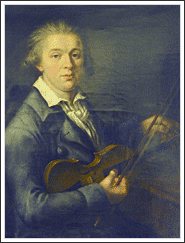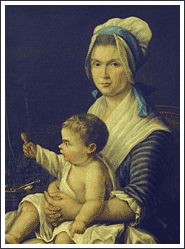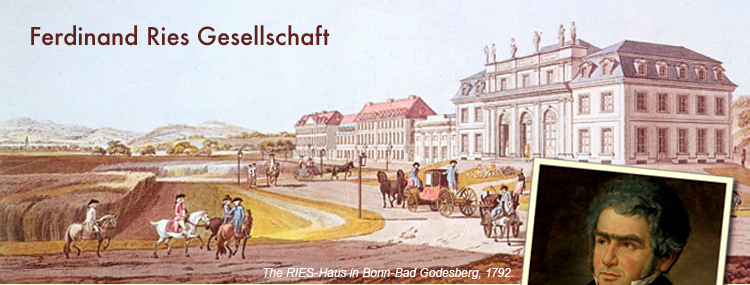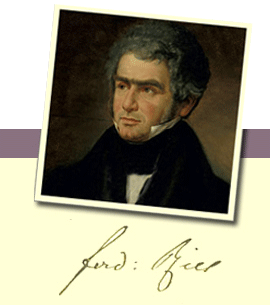Biography - Bonn
 Ferdinand Ries was born on 28th November 1784, the son of Franz Anton Ries (1755-1846) and Anna Gerhardina Horst (1761-1805). He was the youngest member of a significant family of musicians in Bonn with a musical history going back at least as far as his grandfather, Johann Ries (1723-1784), who was a trumpeter, violinist and tenor in the electoral court orchestra in Bonn. He became well-known throughout Germany as a composer of ecclesiastical music. For his employer, the Electoral Prince and Archbishop of Cologne, Clemens August, who was an enthusiastic huntsman, Johann Ries composed, among other works, a Saint Hubert’s Mass in 1756. Two of his four children likewise became members of the court orchestra. His eldest daughter, Anna Maria Ries-Drewer, became a soprano. Ferdinand Ries was born on 28th November 1784, the son of Franz Anton Ries (1755-1846) and Anna Gerhardina Horst (1761-1805). He was the youngest member of a significant family of musicians in Bonn with a musical history going back at least as far as his grandfather, Johann Ries (1723-1784), who was a trumpeter, violinist and tenor in the electoral court orchestra in Bonn. He became well-known throughout Germany as a composer of ecclesiastical music. For his employer, the Electoral Prince and Archbishop of Cologne, Clemens August, who was an enthusiastic huntsman, Johann Ries composed, among other works, a Saint Hubert’s Mass in 1756. Two of his four children likewise became members of the court orchestra. His eldest daughter, Anna Maria Ries-Drewer, became a soprano.
Johann Ries’s youngest son, Franz Anton, was a child prodigy on the violin. Already at the age of 14 he was accepted into the Bonn court orchestra. In 1779 he became a first violinist of the court orchestra and its leader five years later. In 1779 he became a first violinist of the court orchestra in Bonn and its leader five years later. From 1791 he was the “Electoral Music Director”. He taught Ludwig van Beethoven the violin and, as a member of the electoral court, was counted among the most respected citizens of Bonn. As a founder member of the Bonn Reading Society and the Bonn Masonic Lodge he was in close affinity with the with the ideas of the Enlightenment.
The great musical talent of Franz Anton’s son, Ferdinand, became obvious at a very early age. His father gave him “very thorough instruction on the pianoforte and in music altogether” and he received cello lessons from the virtuoso Bernhard Romberg (1767-1841). At the age of nine he had already composed a minuet and by the age of 11 he had written a string quartet for his father’s birthday. By that time he was already undertaking weekly duties on the organ.
 When Napoleon’s army occupied the Rhineland in 1794, the Electoral Prince fled from Bonn and the court orchestra was disbanded. Franz Anton Ries lost not only his position but also a large part of his wealth. In order to feed his growing family he eked out a living by working as a tax collector, smallholder and violin teacher. When Napoleon’s army occupied the Rhineland in 1794, the Electoral Prince fled from Bonn and the court orchestra was disbanded. Franz Anton Ries lost not only his position but also a large part of his wealth. In order to feed his growing family he eked out a living by working as a tax collector, smallholder and violin teacher.
Ferdinand had already been promised a position in the court orchestra, but this was now no longer possible following the flight of the Electoral Prince and the resulting dissolution of the orchestra. In 1797, at the age of about thirteen, he set out as a journeyman in order to complete his musical training, first residing with an organist in Arnsberg in Sauerland, a hilly region in the Electorate of Cologne to the east of the River Rhine, but this only ended in his receiving violin lessons from his organ teacher. His second attempt at continuing his musical training likewise ran counter to his plans. Having arrived in Munich in 1800, he searched in vain for pupils and then had to try and keep his head above water by copying music scores.
At that time Vienna was still the capital of the music world – Napoleon had not yet embarked upon his campaigns against Austria – and so it was decided among his family and friends to send young Ferdinand to Beethoven in Vienna.
|
|
|

